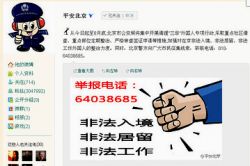Difference between revisions of "Three illegals"
imported>Ciic |
imported>Ciic |
||
| Line 3: | Line 3: | ||
A 100-day crackdown was launched in Beijing on May 15, 2012 to combat what's become known as the "'''three illegals''' ('''三非人员''')." This refers to foreigners who have entered illegally, overstayed their visa or been employed without obtaining a work permit. | A 100-day crackdown was launched in Beijing on May 15, 2012 to combat what's become known as the "'''three illegals''' ('''三非人员''')." This refers to foreigners who have entered illegally, overstayed their visa or been employed without obtaining a work permit. | ||
| − | Citizens of the ROK, the | + | Citizens of the ROK, the U.S., Canada, Russia and Japan were the top five nationalities involved in "three illegal" cases in 2011, according to the exit-entry administration of the Beijing Municipal Public Security Bureau. |
More than 20,000 "three illegal" foreigners were dealt with nationwide in 2011, according to Yang Huanning, vice-minister of public security. | More than 20,000 "three illegal" foreigners were dealt with nationwide in 2011, according to Yang Huanning, vice-minister of public security. | ||
Latest revision as of 08:07, 30 May 2012
A 100-day crackdown was launched in Beijing on May 15, 2012 to combat what's become known as the "three illegals (三非人员)." This refers to foreigners who have entered illegally, overstayed their visa or been employed without obtaining a work permit.
Citizens of the ROK, the U.S., Canada, Russia and Japan were the top five nationalities involved in "three illegal" cases in 2011, according to the exit-entry administration of the Beijing Municipal Public Security Bureau.
More than 20,000 "three illegal" foreigners were dealt with nationwide in 2011, according to Yang Huanning, vice-minister of public security.
With the increasing number of foreigners coming to China, Beijing and other cities need to establish transparent and updated regulations, under which the rights of both foreigners and Chinese can be better protected, said Xu Guangjian, deputy director of the School of Public Administration and Policy at Renmin University of China.
